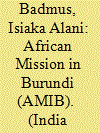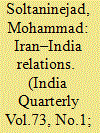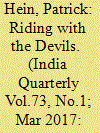|
|
|
Sort Order |
|
|
|
Items / Page
|
|
|
|
|
|
|
| Srl | Item |
| 1 |
ID:
151972


|
|
|
|
|
| Summary/Abstract |
This article examined the African Mission in Burundi (AMIB), assessed its success and drew lessons learned from the experience. The author argued that the mission was successful in restoring peace and stability in Burundi, although the disarmament, demobilisation and reintegration (DDR) component of its mission was not achieved. The willingness of the African Union (AU) to send a peacekeeping mission as a stabilizing force within an ongoing conflict shows that the organization is serious about tackling security issues on the continent. In spite of AU’s endeavours, the article establishes that the AU is being challenged by what is called the ‘triangular area of tension in African peacekeeping (AU’s ambitions versus AU’s peacekeeping capacities versus member states’ political will and agendas). The article concludes with a reflection on lessons learnt from AMIB as a prelude to addressing this area of tension for better future peacekeeping performances in Africa.
|
|
|
|
|
|
|
|
|
|
|
|
|
|
|
|
| 2 |
ID:
151977


|
|
|
|
|
| Summary/Abstract |
The article examined the nature, dynamics and implications of the interactions of interventions and project contexts. It emphasised the centrality of the resources of interventions in driving the mutual, bi-directional impacts of both interventions and project context. Using a grounded theory (GT) research approach, the study investigated the interactions of the Niger Delta Development Commission’s (NDDC) interventions in Odi community in Bayelsa State, Nigeria. A peace and conflict impact theory that emerged offers eight concepts: resource-status of intervention, black hole of interactions (Bhis), likely deprivation, malevolent charity–beggar relationship, oppressiveness and divisiveness of intervention, local capacities for peace (LCP) and federal government presence as a theoretical explanation of the phenomena. It argues that the resource-status the interventions enjoy compels competition from actors at various levels, in a socio-political and cultural space characterised by bad governance and endemic corruption. The competition begins with shady deals among influential actors as they appropriate the resources, constituting Bhis. The combined effects of the resource-status of intervention, Bhis and bad governance and endemic corruption provide sufficient conditions for spirals of negative impacts—likely deprivation, the malevolent charity–beggar relationship, oppressiveness and divisiveness of intervention—down the intervention programming stages. Thus, the potential positive impacts of the interventions are significantly reduced. However, the LCP and federal government presence that the interventions represent cushion the effect of the negative impacts.
|
|
|
|
|
|
|
|
|
|
|
|
|
|
|
|
| 3 |
ID:
151975


|
|
|
|
|
| Summary/Abstract |
This article examines India–Russia relations after the year 2010, as it was in this year that former Russian President Dmitry Medvedev described India–Russia relationship as ‘Privileged Strategic Partnership’ during his New Delhi visit. The article argues that India–Russia relations remain steady in multilateral and bilateral context but some strains have come up in regional context of their relationship, mainly pertaining to Pakistan and Afghanistan. However, since India and Russia are keen to preserve their time-honoured relationship, these issues can be overcome through enhanced interaction in forums such as Brazil–Russia–India–China–South Africa (BRICS) and Shanghai Cooperation Organisation (SCO).
|
|
|
|
|
|
|
|
|
|
|
|
|
|
|
|
| 4 |
ID:
151974


|
|
|
|
|
| Summary/Abstract |
With its enormous natural and human resources, a growing economy and adjacency to Iran’s security and strategic environment, India is considered one of the most important options with which the Islamic Republic of Iran can establish stable and reliable, if not strategic, relations. Despite this, all economic, trade and cultural capacities as well as diplomatic initiatives have not elevated the mutual relations higher than ‘cordial and friendly’. The present article discusses the reasons behind Indo-Iranian failure to create a once desired strategic partnership. The main idea is that differences in the direction and objectives of the relations between Iran and India, that is, balancing the United States for the former and cooperation with Iran besides the United States for the latter, have led to failure of the efforts to establish a strategic partnership. The theory of soft-balancing is used to analyse Iran–India relations when United States as a factor affecting bilateral relations is concerned.
|
|
|
|
|
|
|
|
|
|
|
|
|
|
|
|
| 5 |
ID:
151979


|
|
|
|
|
| Summary/Abstract |
The global emphasis on reduction in carbon footprint has brought the issue of clean energy back into focus. There are two most notable aspects of the debate. The first aspect concerns the tension it has generated globally between the green energy industry and the traditional energy industries while the second aspect of the debate concerns the developing countries, which lack the necessary infrastructure and technology to make the transition to clean energy. This transition amounts to a remarkable shift in the socio-economic paradigms of developing nations like India which have a largely carbon-based economy. In this article, we study the global transition to clean energy using the political economy framework, wherein we analyse the role played by international regimes, national governments and energy companies in facilitating or inhibiting this transition. We also try and ponder over the impact this transition has on emerging economies like India and how they seek to cope with this while resolving the tension between economic growth and sustainability.
|
|
|
|
|
|
|
|
|
|
|
|
|
|
|
|
| 6 |
ID:
151980


|
|
|
|
|
| Summary/Abstract |
Ever since African Union (AU) was established in 1963, the organisation has been charged with the responsibility of preventing, managing and resolving violent conflicts ranging from political violence, terrorism, insurgency and so on. In the African region, AU’s interventions in African states have generated academic debates especially in the Mali and Nigerian crisis. While some scholars consider AU’s intervention as being effective, others consider it ineffective. Either claim, however, is only valid in part and obscures a holistic understanding of the AU as a conflict prevention mechanism in Africa. Using the crisis in Mali and Nigeria as case studies, this article engages with the body of works drawn from each of the aforementioned paradigms, and highlights the inadequacies in exclusively focusing on either side of the debate. In turn, it suggests that, only in the synergy of both paradigms can a broader and more eclectic understanding of all the factors responsible for non-performance of AU be achieved.
|
|
|
|
|
|
|
|
|
|
|
|
|
|
|
|
| 7 |
ID:
151978


|
|
|
|
|
| Summary/Abstract |
Cambodia and Sri Lanka are two tiny states where China has no major strategic stakes. Yet China has been a key regime ally to both regimes at a critical moment during the alleged genocides of 1975–1979 in Cambodia and of 2009 in Sri Lanka. While the failure of Western interventionist peace-building models has been widely discussed, the patterns and outcomes of Chinese non-intervention have not. How did China’s scrupulous respect for non-intervention affect the alleged genocides? The article supports the viewpoint that Chinese non-interference in both states was built on the notion that the building of an independent nation was a top priority in securing sovereignty, order and unity. Hence, China focused on bilateral military aid and economic development, whilst shielding both governments from external scrutiny and international accountability during and after the alleged genocides. China has since made efforts to address and resolve national conflicts through concerted United Nations (UN) procedures and mechanisms.
|
|
|
|
|
|
|
|
|
|
|
|
|
|
|
|
|
|
|
|
|